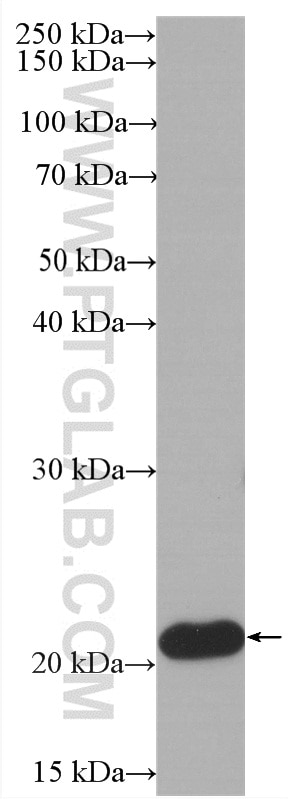Tested Applications
| Positive WB detected in | Jurkat cells |
Recommended dilution
| Application | Dilution |
|---|---|
| Western Blot (WB) | WB : 1:5000-1:20000 |
| It is recommended that this reagent should be titrated in each testing system to obtain optimal results. | |
| Sample-dependent, Check data in validation data gallery. | |
Product Information
HRP-60301 targets BID in WB applications and shows reactivity with human samples.
| Tested Reactivity | human |
| Host / Isotype | Mouse / IgG1 |
| Class | Monoclonal |
| Type | Antibody |
| Immunogen |
CatNo: Ag21005 Product name: Recombinant human BID protein Source: e coli.-derived, PET30a Tag: 6*His Domain: 1-195 aa of BC009197 Sequence: MDCEVNNGSSLRDECITNLLVFGFLQSCSDNSFRRELDALGHELPVLAPQWEGYDELQTDGNRSSHSRLGRIEADSESQEDIIRNIARHLAQVGDSMDRSIPPGLVNGLALQLRNTSRSEEDRNRDLATALEQLLQAYPRDMEKEKTMLVLALLLAKKVASHTPSLLRDVFHTTVNFINQNLRTYVRSLARNGMD Predict reactive species |
| Full Name | BH3 interacting domain death agonist |
| Calculated Molecular Weight | 22 kDa |
| Observed Molecular Weight | 22 kDa |
| GenBank Accession Number | BC009197 |
| Gene Symbol | BID |
| Gene ID (NCBI) | 637 |
| RRID | AB_2883832 |
| Conjugate | HRP |
| Form | Liquid |
| Purification Method | Protein G purification |
| UNIPROT ID | P55957 |
| Storage Buffer | PBS with 50% glycerol, 0.05% Proclin300, 0.5% BSA, pH 7.3. |
| Storage Conditions | Store at -20°C. Avoid exposure to light. Stable for one year after shipment. Aliquoting is unnecessary for -20oC storage. |
Background Information
BID, also named as p22 BID, can be cleaved into p11 BID, p13 BID and p15 BID. It is pro-apoptotic molecules. The major proteolytic product p15 BID allows the release of cytochrome c. BID-L, BID-EL and BID-ES induce ICE-like proteases and apoptosis. BID-S does not induce apoptosis. BID counters the protective effect of Bcl-2. (PMID:14583606).
Protocols
| Product Specific Protocols | |
|---|---|
| WB protocol for HRP BID antibody HRP-60301 | Download protocol |
| Standard Protocols | |
|---|---|
| Click here to view our Standard Protocols |




